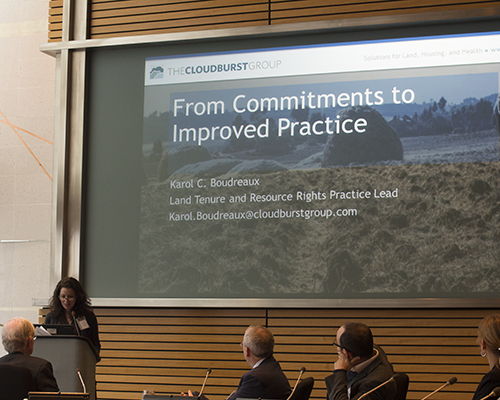 At the 2015 World Bank Conference on Land and Poverty, The Cloudburst Group’s Land Tenure and Natural Resource Management Practice Lead, Karol Boudreaux examined the Coca-Cola Company’s recent efforts to make its sugar supply chain more responsible with respect to land rights. Coca-Cola, which is the world’s largest purchaser of sugar, has received criticism for illegal takings by its sugar suppliers in developing countries. On March 25, Ms. Boudreaux joined Coca-Cola’s Director of Global Workplace Rights, Ed Potter, Oxfam America’s Christopher Jochnick, Illovo Sugar Company’s Kate Mathias, and Inclusive Development International’s David Pred for a panel discussion on turning land rights commitments into practice in the sugar sector.
At the 2015 World Bank Conference on Land and Poverty, The Cloudburst Group’s Land Tenure and Natural Resource Management Practice Lead, Karol Boudreaux examined the Coca-Cola Company’s recent efforts to make its sugar supply chain more responsible with respect to land rights. Coca-Cola, which is the world’s largest purchaser of sugar, has received criticism for illegal takings by its sugar suppliers in developing countries. On March 25, Ms. Boudreaux joined Coca-Cola’s Director of Global Workplace Rights, Ed Potter, Oxfam America’s Christopher Jochnick, Illovo Sugar Company’s Kate Mathias, and Inclusive Development International’s David Pred for a panel discussion on turning land rights commitments into practice in the sugar sector.
Ms. Boudreaux applauded Coca-Cola’s attempt to “do the right thing” by confronting illegal land taking by its sugar suppliers but she questioned whether Coca-Cola had the rights tools and methods to assess complex land right issues in the countries where it is sourcing sugar, such as Colombia and Guatemala. In these countries, as in much of the developing world, rights to land and resources are frequently unclear, poorly enforced and governed by complex and often overlapping laws, regulations and customary authorities. Determining who has rights to own and occupy which pieces of land can be very challenging – particularly in post-conflict countries and when private sector actors do not have expertise in conducting land tenure assessments.
Reuters covered the discussion, during which Ms. Boudreaux asked:
“How did the owners acquire title documents? Were communities consulted? Were they compensated for their land? Were women’s title considered?” Boudreaux said at the World Bank session on Tuesday.
“I cannot tell from the evidence that Coke presents,” she told Ed Potter, the company’s director of global workplace rights, who agreed to take her advice and improve the company’s review processes.
Read more here: http://www.reuters.com/article/2015/03/25/landgrab-coke-idUSL2N0WQ1UI20150325

